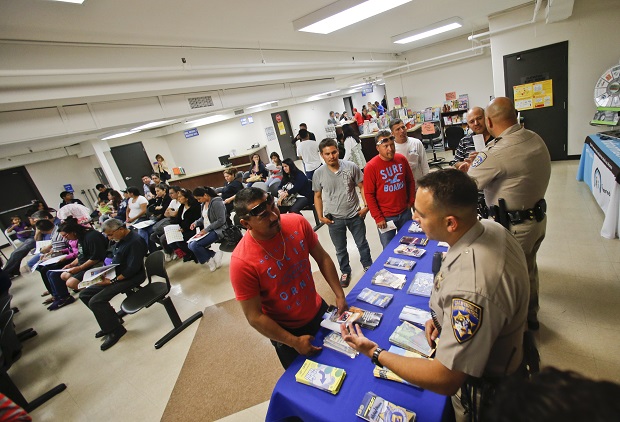California issues driver licenses for illegal immigrants

FILE – In this April 23, 2014, file photo, California Highway Patrol officers Armando Garcia, right, and Ray Patton explain to immigrants the process of getting a drivers license during an information session at the Mexican Consulate, in San Diego. California is gearing up to start issuing driver’s licenses to immigrants in the country illegally in a bid to make the roads safer that could also give more than a million people access to state-issued identification. AP
LOS ANGELES, United States – California began issuing driver’s licenses Friday to people who are in the country illegally, becoming the 10th state in the nation to do so.
Thanks to a 2013 law approved by Governor Jerry Brown, anyone who can show they are California residents – such as through bills or rental agreements – can now apply for a license, regardless of immigration status.
Opponents fear the law will encourage immigrants to come to the United States, and worry some might use false names to register for a license, thereby creating national security concerns.
Advocates say it means more drivers will get car insurance and will make the roads safer.
Until now, immigrants in California without legal authorization risked heavy fines or vehicle seizures for driving without a license. Many do anyway, as much of the huge West Coast state lacks comprehensive public transit.
Article continues after this advertisementCalifornia has the largest undocumented immigrant population in the United States, about 2.45 million.
Article continues after this advertisementThey must still provide proof of identity, such as a passport.
The state’s Department of Motor Vehicles expects some 1.4 million people to request a license.
DMV director Jean Shiomoto said the law would “increase safety on California roads by putting licensed drivers behind the steering wheel.”
As DMV offices opened early Friday, hundreds of people lined up to be among the first to request a license under the new rules.
Miguel Pineda, 37, has been driving illegally for 15 years and was among those applying.
“I got nervous when it was my turn to take the (driving) test. But it was easy,” he told the Los Angeles Times.
He said he had been stopped in 2005 and had to shell out almost $1,500 after his car was confiscated.
Los Angeles city Councilman Gilbert Cedillo was among those supporting the law.
“It was difficult politically to carry a legislation for a community that was vilified, not appreciated, and marginalized,” he told the LA Times.
Colorado, Connecticut, Illinois, Maryland, Nevada, New Mexico, Utah, Vermont and Washington state already have similar laws.